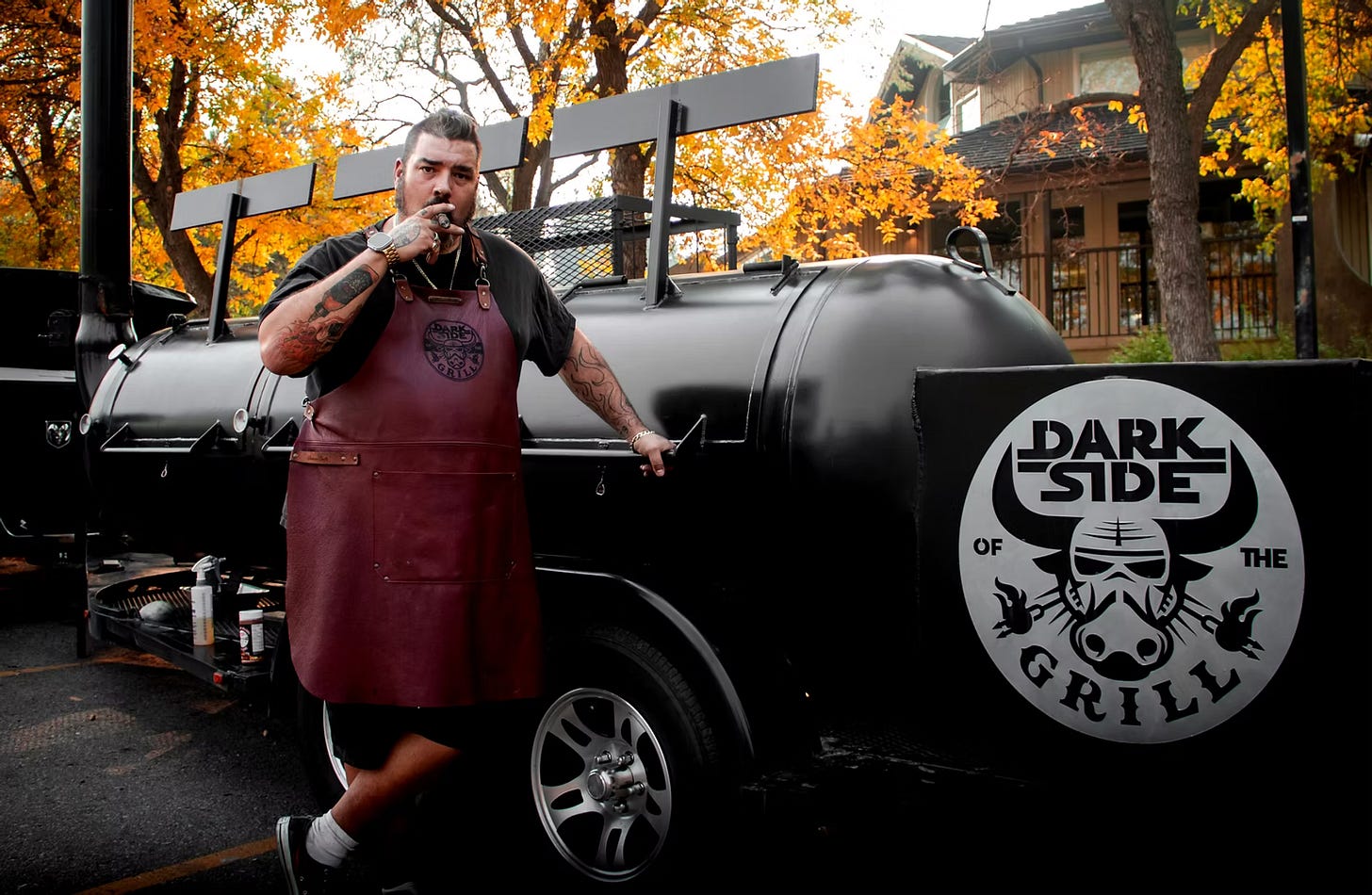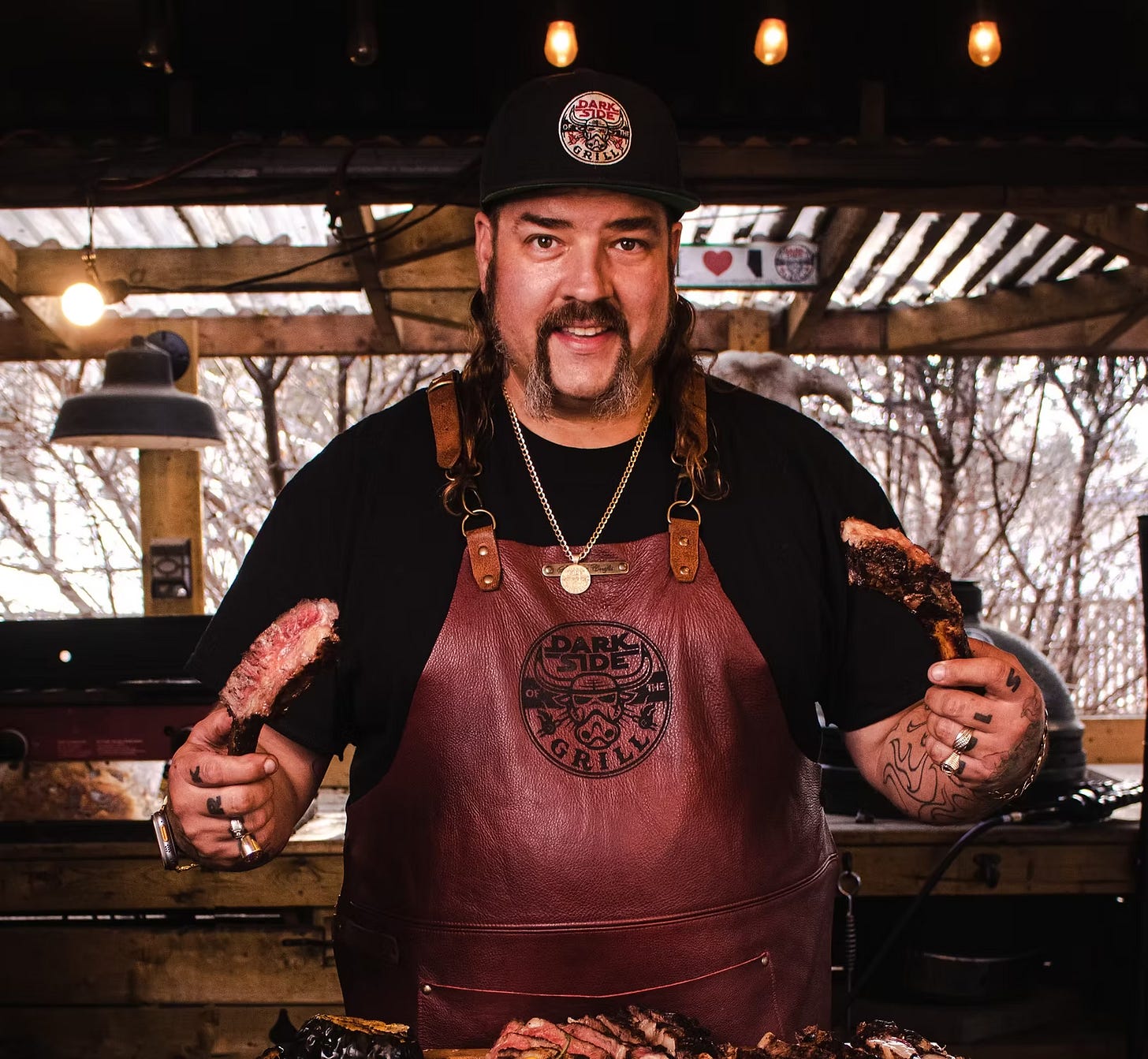The Shared Language of Fire
“The fire brings us together,” he said. “But it also reminds us how small we are.”
There’s something about fire that humbles a man.
Maybe it’s the way it refuses to be rushed. The way it demands your attention, your respect, your patience. When I sat down with Mel, better known as Darkside of the Grill, we weren’t just two pitmasters swapping stories. We were two men from different sides of the map, united by the same language: flame.
Mel came down from Canada after a string of events, fresh off his Eggtober Fest win, still smelling faintly of smoke and victory. And as soon as we started talking, I realized that what connected us wasn’t just barbecue. It was what fire meant to both of us, the discipline, the fellowship, the peace it brings in a chaotic world.
Fire doesn’t care about borders or accents. It doesn’t care if you’re burning oak in Georgia or birch in Alberta. Once the embers glow and the smoke rises, we all speak the same language. There’s a rhythm to it, that dance between control and surrender, that every pitmaster understands.
Mel said something that stuck with me. He talked about how, when he cooks, the fire feels alive, unpredictable, almost sentient. He compared it to a conversation. You don’t command it; you listen, you adjust, you learn. That’s the thing about this craft: it’s not about domination. It’s about respect.
Too many folks think barbecue is about showing power, about who’s got the biggest pit or the fanciest rig. But those of us who live it know better. Fire doesn’t reward arrogance; it rewards humility. It’ll humble you quickly. The wind changes direction, the wood smokes too fast, your patience slips, and suddenly the meal you’ve tended for hours turns on you.
Mel and I laughed about that, the kind of laughter that comes from shared scars. You’ve got to earn your place at the fire. Every cook teaches you something new, and sometimes the lesson comes wrapped in failure. He told me about burning a cook so badly early on that he nearly quit. I nodded because I’ve been there. We all have. But the beauty of fire is that it gives you another chance, another dawn, another cook, another spark.
We drifted into a conversation about community, how fire has always been the center of it. You can trace human history through smoke rings and campfires. Before recipes, before culinary schools, there were people gathered around a flame, passing down knowledge by hand and by story. Mel said up north, when the weather turns mean, folks gather around the pit just to feel connected again. Down here in the South, it’s the same thing; we call it a cookout, but it’s really communion.
What struck me most was how Mel sees fire as a teacher. “It doesn’t let you fake it,” he said. And he’s right. In a world obsessed with shortcuts, AI recipes, smart probes, and instant gratification, fire still insists on truth. It reveals who you are. You can’t bluff your way through a 16-hour brisket. You can’t hide your frustration from a flame. It will test your patience, your persistence, and your pride, and when it’s done, it’ll hand you a plate of something that tastes like redemption.
We both agreed: that’s why barbecue folks are different. It’s not the smoke or the sauce, it’s the temperament. The long hours by the pit, the stillness, the waiting, it all strips you down to something honest. Whether you’re cooking in a backyard or for a festival crowd, fire has a way of making equals out of all of us.
There’s a quiet poetry to watching someone else tend a pit. You notice their rhythm, their rituals, how they feed the fire, how they hover just close enough to feel the heat. No two cooks are the same, but we’re all trying to find that same harmony. And that’s what makes community matter so much in this craft. You learn by standing beside someone who’s been burned before. You share wood, stories, and silence. And somehow, that becomes a bond stronger than smoke.
Before we wrapped up, Mel said something that I’ve been turning over ever since. “The fire brings us together,” he said. “But it also reminds us how small we are.”
That hit me. Because he’s right, every spark we chase, every ember we nurture, is a reminder that we’re part of something older and bigger than ourselves. The same element that built civilizations now builds friendships. The same flame that forged tools now forges communities. That’s the paradox of fire: it’s both humbling and empowering. It reminds you that you’re not in control, but it also reminds you what’s possible when you show up with patience, presence, and respect.
As I packed up my gear that night, I thought about how strange and beautiful it is that two men from different worlds could find common ground in a pile of glowing coals. Fire doesn’t need translation. It doesn’t care about geography or ego. It just asks for attention, and in return, it gives warmth, flavor, and connection. Maybe that’s why we keep coming back to it. Because every cook, every flame, is another chance to remember that no matter where we are, we’re all just people trying to stay warm together.





“Fire doesn’t reward arrogance, it rewards humility.” So much to chew on from this article. 😮💨